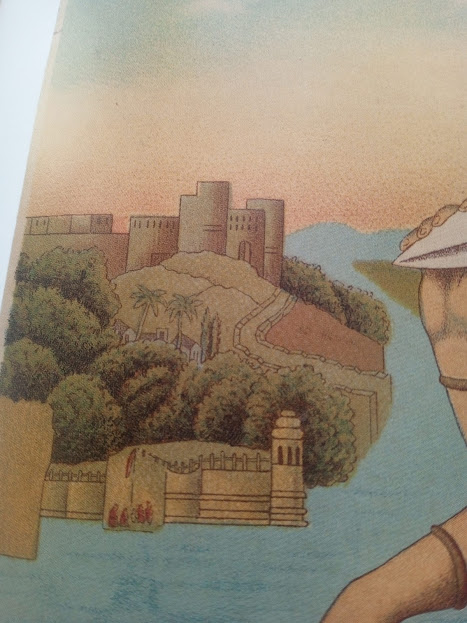Other cultures, what even do they look like. A question for academics. Here in the Mughals Painting workshop (about 1500), and the German Print Shop (early 20thC), we are on a deadline people! The Mughal says "Draw Youropeen", Herr Schvitz say "Draw Indian God for export schnell!" What goes in the background? Yourpeen things, Ynjan things I don't know just finish the fucking picture!
We start with whats honestly a pretty great painting of a foreigner from the Mughals court (I think Akbar? Dunno and I'm not checking).
Youropeen
But whats happening here in the background of this very Youropeen landscape?
Youropeen plant
And where do Youropeens live? Hut or possibly city...
(Honestly not bad for 1500 or so)
How do they worship? Ehhhh hmm temples?
"Here we go worshipping christ again! As we commonly do here in Yourop!"
Meanwhile, (in fact several hundred years later), Germany leads der printing welt! Time to impinge on British Raj mit VORGESETZTER prints of Indian Gods for popular market! Quick, draw Vishnu!
Not that bad? A bit stiff and euro-saintlike but wait, what is India even like anyway?
They have.. der schloss?
Aaaand... seltsame runde Dinge, vielleicht ist es ein Dock, ich weiß es nicht
Never mind, draw Krishna!
Krishna with his Gopis
Perfect! Now eine Stadt in den Hintergrund schieben oder so
what do Ynjan cities look like?
Vvvvenice? Kind of?
and uh.. gebäude.. setzt...











Weird! A perdurable, cross-cultural style guide. Though that can be said for all art, I suppose.
ReplyDeleteIt reminds me a lot of generic 'Fantasy' art. Maybe if you strip away the specific signifiers and just try to draw something "foreign" and monumental, thats what you get.
DeleteIt interests me how difficult it is sometimes to imagine something we never saw, how mind falls back on the patterns of already recognizable things.
ReplyDeleteFor non-picture example, it always of interest to me how much the monsters or mutations or gods or SF species that supposed to be different and/or more advanced than humans are just messed up animals and people (and, more rarely, plants and crystals) or parts thereof combined, but people rarely if ever can imagine something actually as different and new comparatively to humanity as the humanity different from, say, wolves, even if monsters and mutations come from Chaos where everything is, theoretically, possible. Mostly this vast possibility takes forms already familiar, just like for those painters, who defaulted to India-like women and German-like buildings respectively because they couldn't imagine or had no detailed description of what these actually could be.
I have some sympathy because how else can you explain or communicate otherness to a wide audience except by that which is known?
DeleteIt's just like the medieval illustrations of the Trojan war, with all the knights in plate armour riding warhorses.
ReplyDeleteOr the Hammer films where everyone sports 19th century clothing and 1970s hairstyles.
Yes it creates an interesting blurred boundary between fiction and history
DeleteAs a German native speaker, kudos to the Germanish, it put a smile on my face.
ReplyDelete